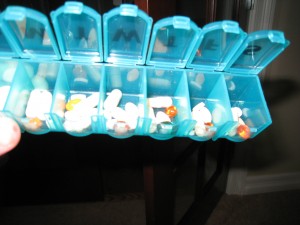When it was first suspected that I might have a gastrointestinal disorder, they first did an EGD (upper endoscopy). It came back normal, besides a positive test for Barrett’s Esophagus. Next, they did a Gastric Nuclear Imaging Scan – also known by many as the egg test. For this you eat eggs that are radioactive. Scans are done periodically (how often depends on the doctor ordering the scans and the facility doing the scans), mine done at 15 minute intervals for the first hour, every hour for 2 hours then again at the 4 hour mark. It doesn’t hurt but is horrendously boring – if you are having this test done, bring something to entertain yourself (I suggest a laptop or DVD player)!
The test showed significant gastric emptying delay and was confirmed from that test, and the symtpoms of 24/7 nausea, distention, pain, early satiety and bloating, that I had gastroparesis. No one knows how I developed it, but it is hypothesized that I contracted a virus which ate away at my vagus nerve controlling my stomach, thus partially paralyzing it. I have idiopathic gastroparesis. Finally a diagnosis, but now what?
First round of motility drugs started, in hopes it would stimulate my stomach to empty. I was started on Reglan (metoclopramide), 4x a day 30 minutes before every meal and one before bed. Two days into this treatment and I had to stop. I developed severe anxiety and hand tremors (which I still experience a bit even today). This is because Reglan can cross the brain/blood barrier and mess with the nerves in the brain. Sometimes it can cause permanent Tardive Dyskinesia, something I feared I was developing. Some people, however, have a lot of success with Reglan and have taken it for many years without any issues. For me though, this unfortunately, was not the case.
After I got off Reglan, I was tried on Erythromycin. Erythromycin is actually an antibiotic but has a side-effect of increasing gastric and intestinal motility. Yeah, I got prescribed something for its side effect. Sadly, this also did not help me. A minor setback given that under my impression, Erythromycin can only be used as a temporary solution since the antibiotic often becomes ineffective as the body adapts to it.
My doctor offered a last hope for relief by medication, and that hope was called Domperidone. Domperidone is not available in the United States but can be ordered from other countries (usually Canada) if accompanied by a doctor prescription. The reason it isn’t available in the United States is due to a slight side effect of tachycardia, or rapid heart rate, which could cause heart attacks. This is why your doctor may do periodic EKGs while taking Domperidone. Domperidone also takes awhile to kick in. I took it for 2 months without seeing any changes and therefore stopped the medication. Nothing seemed to work, and I continued to lose weight and feel sick. My doctor felt that surgery was the next step in controlling symptoms of my gastroparesis.
I did however have to remain on maintenance medications and here is a link to that silly dropdown menu some browsers have difficulty handling =)








2 Responses
Amanda says...
Hi, I stumbled across your blog while doing some research on gastroparesis. I am 21, and I have struggled with anorexia since I was 9 years old. When I was 20 I was diagnosed with mild gastroparesis. Last April my parents left for a weekend and came back sick. I also got sick and remained sick for a month. A few weeks later suddenly i’m in constant pain and nothing, not even liquids will stay down. I am really scared about what will happen. I have been on eyrthamicin for almost 2 years, and when I got sick I was taken off and put on reglan, both of which do not work. At this point I am desperate for relief of my nausea and general pain and vomiting. I read everything on your blog, fascinated by you. You are really an inspiration and you made me feel so much better. I am sorry you have been “blessed” with gastroparesis too, but your blog reached out to me, thank you.
Kirby says...
Nausea is such a difficult symptom to control. There are a few things I could recommend you research and talk to your doctor about and see if it will, in any way, help. I take IV Zofran through my portacath, but it is available in tablets as well. This has been the best nausea medication for me so far. Also, Benedryl works for nausea. I take the children’s liquid version and adjust the dosage accordingly. It also comes in IV and tablets. Because of my seizures and epilepsy, I am no longer allowed IV Benedryl due to its ability to lower seizure threshold. This medication also makes one drowsy, so I only take it at night or if the nausea is so bad, I know I won’t be going anywhere anyway. I also take a liquid form of phenergan. It comes in an IM injection (only some people are lucky enough to be allowed this form of medication; I am not for a few undisclosed reasons), liquid and tablet. I take the liquid, even though it tastes rather disgusting. It will also make one drowsy but I think this side effect is temporary as you adjust to the medication. ANY medication I take, I try to get in liquid form as it is more easily passed through my stomach, or has a higher chance of doing so and being absorbed. Not all of my medications are liquid, IM or IV, but I do what I can and thankfully have a GI who understands this principle of the workings in GP patients.
A side note about Reglan: I was on it briefly but unfortunately suffered major side effects. The main one being TARDIVE DYSKINESIA. I also became overly anxious and could not sit at my computer for any length of time. It also gave me restless leg at night. I was first put on Reglan before they moved me to Erythromycin (which was also unsuccessful). Erythromycin is more commonly used in GP patients to increase gastric emptying rates (which I guess has a welcomed side effect of reduced nausea). There is another medication called Propulsid, however it was removed from the US market. I believe, just as Reglan, it can be obtained through Canada with the right doctor. It has the possibility of affecting the heart so frequent EKGs would be necessary throughout treatment. From what my GI said, it is one of the more successful drugs.
I hope this information helps you in your quest to find relief from your symptoms. I also hope you have a great GI doctor or PCP who is willing to work with you in finding that relief.